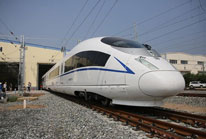

China doesn't have to be overly sensitive about Japan's cooperation with Sri Lanka in the construction of harbors located along key maritime routes in the Indian Ocean, as long as the harbors will not be used for military purposes.
Media reports have said Japan's government is almost determined to send a delegation to Sri Lanka this autumn to support the construction of harbors in the South Asian country. Japan has recently played a positive and proactive role in extending economic support to the island nation, with some observers speculating that Japan wants to boost its ties with Sri Lanka to counter China's own rising presence.
Sri Lanka's strategic importance in the Indian Ocean has made it an increasing point of focus, but hopefully it will not become a center of geopolitical confrontation. Any party, China included, would suffer losses if cooperation with Sri Lanka is treated as mutually exclusive.
China is likely to adopt an open attitude toward Japan's increasing interaction with Sri Lanka over the construction of harbors in the Indian Ocean. The global economy is not a zero-sum game and Japan's efforts to improve infrastructure in Sri Lanka will likely benefit Chinese enterprises that plan to invest in Sri Lanka's manufacturing sector or transport goods via harbors in the region.
We hope Japan will play a more proactive role in improving infrastructure in not only Sri Lanka but also in the wider South and Southeast Asian area, and that Japan and China will not fall into any strategic confrontations in the process. Rather, China should encourage Japan, or any country, that is willing to provide more financial support for infrastructure development in the region.
According to media reports, Asia has a funding gap of about $800 billion a year for necessary infrastructure projects from 2010 to 2020. Such a massive shortfall in funding for infrastructure suggests that increased investments from both China and Japan would not encroach on each other's strategic space. In contrast, such investment would be beneficial to all Asian countries.
Japanese firms doing business in countries along the One Belt, One Road route, Sri Lanka included, might discover there are advantages to be had from the various projects of the initiative. Japan seems to have no strong desire to respond to China's route initiative and has yet to express interest in joining the China-initiated Asian Infrastructure Investment Bank. The Belt and Road initiative is not about marking Beijing's strategic circle, but is instead an open-ended initiative for the region as a whole.
For the sake of Asian development, Japan should have a more positive attitude about its involvement in the Belt and Road initiative.
The author is a reporter with the Global Times. [email protected]
 World's fastest bullet train to start operating next month
World's fastest bullet train to start operating next month Huangluo: China's 'long hair village'
Huangluo: China's 'long hair village' Spectacular bridge with one of the tallest piers in the world
Spectacular bridge with one of the tallest piers in the world Magnificent view of Hukou Waterfall
Magnificent view of Hukou Waterfall A glimpse of Stride 2016 Zhurihe B military drill
A glimpse of Stride 2016 Zhurihe B military drill US Navy chief tours Liaoning aircraft carrier
US Navy chief tours Liaoning aircraft carrier Chinese American woman wins Miss Michigan
Chinese American woman wins Miss Michigan Centenarian couple takes first wedding photos
Centenarian couple takes first wedding photos Traditional Tibetan costumes presented during fashion show
Traditional Tibetan costumes presented during fashion show Top 10 livable Chinese cities
Top 10 livable Chinese cities Top 20 hottest women in the world in 2014
Top 20 hottest women in the world in 2014 Top 10 hardest languages to learn
Top 10 hardest languages to learn China’s Top 10 Unique Bridges, Highways and Roads
China’s Top 10 Unique Bridges, Highways and Roads Celebrity split grips nation, triggers debate on marriage
Celebrity split grips nation, triggers debate on marriage Chinese fans of S.Korean pop culture stay loyal despite rumored ban
Chinese fans of S.Korean pop culture stay loyal despite rumored ban Is bronze good enough for Chinese fans?
Is bronze good enough for Chinese fans? Foreign actors in China share their experience dramatizing one-dimensional and stereotyped roles
Foreign actors in China share their experience dramatizing one-dimensional and stereotyped rolesDay|Week